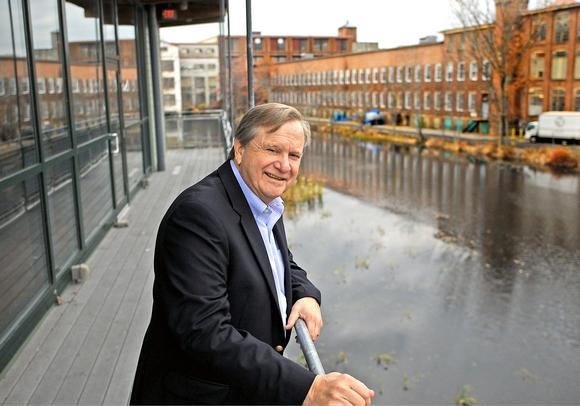November 2016
Alternatives Unlimited Inc., with headquarters in Whitinsville, is celebrating its 40th year of helping people with developmental and psychiatric disabilities integrate into communities and lead more satisfying lives. The organization provides its clients with services so that they can get jobs and homes and experience friendships. Last year, 1,200 area residents were involved in its 60 residential, employment and day programs across central Massachusetts. Alternatives has approximately 800 employees. Executive Director Dennis Rice founded Alternatives in 1976, with three programs helping 26 individuals. He has a bachelor’s degree from Alma College in Michigan and a master’s in education from Harvard University.
What prompted you to start Alternatives, and what was your initial goal?
"During the Vietnam War, I was a conscientious objector, which means you don’t pick up a gun but you need to serve. I served at the psychiatric unit at Cambridge City Hospital for three years. I really enjoyed it. I noticed very quickly that people would come in and were quite unwell and suffering, and in two or three weeks, they’d be put back together. But lo and behold, a week or month later, that person would come right back in, because there were no community-based services for support once they got out of the hospital. One of the motivators for Alternatives was to set up that support system. At that time, the state was sued through a class action suit to improve the horrible conditions in the institutions as well as to find community-based programs.
The goal was to get them out of institutions. It was like a new frontier. I remember at Munson State School, they wanted people to go out, but didn’t have a process. So we would stand there behind the dorms and as people walked by say, “Hey, you want to live in a group residence?†We’d do a quick assessment. Even though we’d met them seconds before, everyone said yes. We’d take them for an overnight to make sure it was something they wanted. When we came back, we’d talk to administrators, and the person would gather his belongings in a little box and move to a group residence. We started by getting 26 people out. Since then, we’ve supported thousands of people over 40 years."
How do you help clients develop relationships?
"We put an emphasis on helping them develop friendships in the community with regular folk. We get them to join a club or association, like a book club at the local library. Programs develop community projects where they’d work with another organization to do something that’s needed. We work with Lions and Rotary clubs, one of the schools in Gardner to refurbish a playground or paint a mural … We fund those with bridging grants up to $3,000. We have a one-act play festival, we sponsor part of the lower Charles trail. Another approach is Club 21 where we match 10 people we serve with 10 community volunteers. They have a social club that meets twice per month. You’re partnered with one individual at first, then maybe something with two or three others, and eventually the whole group. There’s the possibility of 400 different relationships between 21 people.
Part of this is recovering from social exclusion. Those opportunities are within the community, not Alternatives. We became more of a bridging organization and a community player. That’s why we restored this beautiful mill. It’s a place where people of all abilities can come and enjoy arts and culture activities."
How would you sum up what Alternatives does?
"We provide residential, employment and day services to a variety of adults with disabilities, and we like to say we help them start each day with a personalized plan to improve their lives. We serve 400 adults with developmental disabilities and 800 people on the psychiatric side, most of whom live in their own apartments or with roommates. We have 500 apartments throughout Central Mass."
How does art/theater/music play into what you do?
"It’s certainly what we have here. Why did we restore the mill? It’s also historical preservation, it’s green; we’re 90 percent self-sufficient. Our priority is to live in a collaborative community with a strong sense of place, so we feel all the activities at the Whitin Mill contribute toward that end — so people can feel they’re part of something. We basically took this out-of-work mill and turned it into an inclusive treasure for the whole region to enjoy. By taking a leadership role in arts and culture, historical preservation and green technology, the community is much more open to who we are."
Worcester Telegram & Gazette
November 2016

